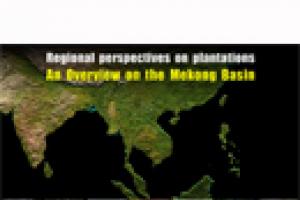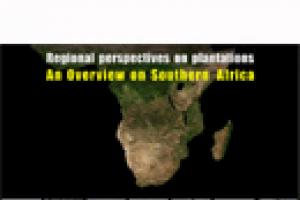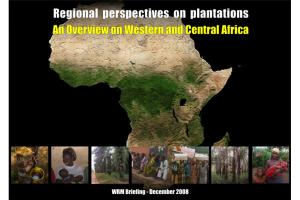Eucalyptus, oil palm, rubber and jatropha monoculture plantations are expanding onto local communities’ lands and forests in the Mekong region’s countries. Promoted under the guise of development, poverty alleviation and even climate change mitigation, such plantations are resulting in severe social and environmental impacts.
Large-Scale Tree Plantations
Industrial tree plantations are large-scale, intensively managed, even-aged monocultures, involving vast areas of fertile land under the control of plantation companies. Management of plantations involves the use of huge amounts of water as well as agrochemicals—which harm humans, and plants and animals in the plantations and surrounding areas.
Publications
15 December 2008
Timber plantations in southern Africa are concentrated in South Africa, Zimbabwe and Swaziland, but they are also expanding in Mozambique. There are smaller areas in Angola, Zambia, Malawi and Tanzania. In South Africa, the largest areas are in the provinces of Mpumalanga, KwaZulu-Natal and the Eastern Cape, covering 1.5 million hectares of land. Additionally, an estimated 1.6 million hectares have been invaded by plantation species such as acacias (wattle), eucalyptus (gum) and pines.
Publications
15 December 2008
Oil palm and rubber plantations occupy extensive areas in many countries in tropical Africa. In spite of their social and environmental impacts, until now they have received scant attention both at the national and international level.
Publications
15 December 2008
Switching from fossil to alternative liquid fuels would appear to be a good idea, particularly in the context of climate change. Such is the case of converting the cellulose contained in plants into different types of fuels, among which liquid ethanol, that could be used in transport as an alternative to gasoline. However, current developments in this field show a number of threats that need to be highlighted.
Bulletin articles
15 December 2008
Welcome to the Mekong region!
Bulletin articles
15 December 2008
The inter-meshing of the six economies in the Mekong Basin since the 1990s has been fostered under the Greater Mekong Sub-region economic cooperation programme. This was aimed at increasing the flow of cross-border investment from countries with considerable economic might such as China, Thailand and Vietnam into neighbouring countries such as Laos PDR and Cambodia, which have a ‘doors wide open’ approach calling for foreign companies to come to invest.
Other information
15 December 2008
China’s growing pulp and paper market is being the world's fastest. Although per capita paper consumption is less than ten per cent of the amount consumed in the US, China accounts for 14 per cent of global paper consumption. Jaakko Pöyry has estimated that paper consumption in China would increase at 4.4 per cent a year between 2000 and 2015. Much of that “consumption” is used in packaging of goods for export, which means that real per capita paper consumption in China is actually much lower.
Other information
15 December 2008
Investments by foreign companies in commercial tree plantations in Laos PDR increased sharply increased during 2004-2006. Large scale plantations are promoted through state land concessions. Currently, an area of 167,000 ha has been transferred to foreign companies under large scale land concessions in the central and south regions of Laos. Of these, 48% or 80,000 ha are dedicated to rubber, and 28% of 46,600 ha are allocated to growing eucalyptus. However, the total area for growing rubber throughout the country has increased to 182,900 ha.
Other information
15 December 2008
Since 2006 the small landlocked South East Asian nation of Laos has seen an explosion of small, large and medium scale plantations, particularly rubber, eucalyptus and biofuel crops. This increase in industrial tree plantations has not come about by itself however, but has been promoted by IFI's over the past decade as a means to increase Lao GDP. Foremost among the promoters of plantations development in Laos is the Asian Development Bank.
Other information
15 December 2008
Rubber is one part of life of the people of the South, related both to the culture and economy of the last 108 years. The monoculture production system has replaced a traditional system of rubber forests, where rubber used to be grown in amongst fruit orchards and natural forests known as a suan somrom or “integrated garden”. Rubber plantations have been promoted through the government’s Welfare Fund for Rubber Plantations.
Other information
15 December 2008
Every year for the past decade or so, Vietnam has faced paper shortages. This year is no exception. In May 2008, Vietnam's
newspapers reported that publishing houses and printers were facing difficulties in buying supplies. The shortages were happening even though the country's two biggest pulp and paper mills, Bai Bang and Tan Mai were operating at full capacity and paper imports had increased sharply during the first months of the year.
Bulletin articles
15 December 2008
Just outside the climate change conference in Poznan this morning, Friends of the Earth held a demonstration against the World Bank's funding of coal-fired power plants. World Bank figures on stilts wearing black suits fought against polar bears, throwing pieces of coal at them. "This is a typical example of how European NGOs just don't get it on climate change," someone behind me said. It turned out he worked with the Asian Development Bank in the Bank's climate change unit.




